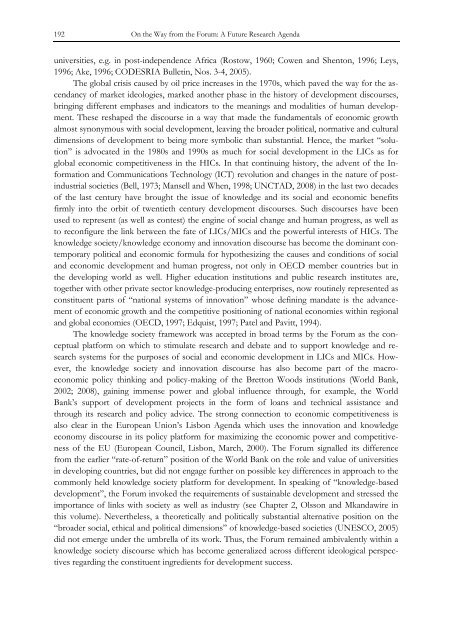Higher education, research and innovation ... - unesdoc - Unesco
Higher education, research and innovation ... - unesdoc - Unesco
Higher education, research and innovation ... - unesdoc - Unesco
Create successful ePaper yourself
Turn your PDF publications into a flip-book with our unique Google optimized e-Paper software.
192 On the Way from the Forum: A Future Research Agenda<br />
universities, e.g. in post-independence Africa (Rostow, 1960; Cowen <strong>and</strong> Shenton, 1996; Leys,<br />
1996; Ake, 1996; CODESRIA Bulletin, Nos. 3-4, 2005).<br />
The global crisis caused by oil price increases in the 1970s, which paved the way for the ascendancy<br />
of market ideologies, marked another phase in the history of development discourses,<br />
bringing different emphases <strong>and</strong> indicators to the meanings <strong>and</strong> modalities of human development.<br />
These reshaped the discourse in a way that made the fundamentals of economic growth<br />
almost synonymous with social development, leaving the broader political, normative <strong>and</strong> cultural<br />
dimensions of development to being more symbolic than substantial. Hence, the market “solution”<br />
is advocated in the 1980s <strong>and</strong> 1990s as much for social development in the LICs as for<br />
global economic competitiveness in the HICs. In that continuing history, the advent of the Information<br />
<strong>and</strong> Communications Technology (ICT) revolution <strong>and</strong> changes in the nature of postindustrial<br />
societies (Bell, 1973; Mansell <strong>and</strong> When, 1998; UNCTAD, 2008) in the last two decades<br />
of the last century have brought the issue of knowledge <strong>and</strong> its social <strong>and</strong> economic benefits<br />
firmly into the orbit of twentieth century development discourses. Such discourses have been<br />
used to represent (as well as contest) the engine of social change <strong>and</strong> human progress, as well as<br />
to reconfigure the link between the fate of LICs/MICs <strong>and</strong> the powerful interests of HICs. The<br />
knowledge society/knowledge economy <strong>and</strong> <strong>innovation</strong> discourse has become the dominant contemporary<br />
political <strong>and</strong> economic formula for hypothesizing the causes <strong>and</strong> conditions of social<br />
<strong>and</strong> economic development <strong>and</strong> human progress, not only in OECD member countries but in<br />
the developing world as well. <strong>Higher</strong> <strong>education</strong> institutions <strong>and</strong> public <strong>research</strong> institutes are,<br />
together with other private sector knowledge-producing enterprises, now routinely represented as<br />
constituent parts of “national systems of <strong>innovation</strong>” whose defining m<strong>and</strong>ate is the advancement<br />
of economic growth <strong>and</strong> the competitive positioning of national economies within regional<br />
<strong>and</strong> global economies (OECD, 1997; Edquist, 1997; Patel <strong>and</strong> Pavitt, 1994).<br />
The knowledge society framework was accepted in broad terms by the Forum as the conceptual<br />
platform on which to stimulate <strong>research</strong> <strong>and</strong> debate <strong>and</strong> to support knowledge <strong>and</strong> <strong>research</strong><br />
systems for the purposes of social <strong>and</strong> economic development in LICs <strong>and</strong> MICs. However,<br />
the knowledge society <strong>and</strong> <strong>innovation</strong> discourse has also become part of the macroeconomic<br />
policy thinking <strong>and</strong> policy-making of the Bretton Woods institutions (World Bank,<br />
2002; 2008), gaining immense power <strong>and</strong> global influence through, for example, the World<br />
Bank’s support of development projects in the form of loans <strong>and</strong> technical assistance <strong>and</strong><br />
through its <strong>research</strong> <strong>and</strong> policy advice. The strong connection to economic competitiveness is<br />
also clear in the European Union’s Lisbon Agenda which uses the <strong>innovation</strong> <strong>and</strong> knowledge<br />
economy discourse in its policy platform for maximizing the economic power <strong>and</strong> competitiveness<br />
of the EU (European Council, Lisbon, March, 2000). The Forum signalled its difference<br />
from the earlier “rate-of-return” position of the World Bank on the role <strong>and</strong> value of universities<br />
in developing countries, but did not engage further on possible key differences in approach to the<br />
commonly held knowledge society platform for development. In speaking of “knowledge-based<br />
development”, the Forum invoked the requirements of sustainable development <strong>and</strong> stressed the<br />
importance of links with society as well as industry (see Chapter 2, Olsson <strong>and</strong> Mk<strong>and</strong>awire in<br />
this volume). Nevertheless, a theoretically <strong>and</strong> politically substantial alternative position on the<br />
“broader social, ethical <strong>and</strong> political dimensions” of knowledge-based societies (UNESCO, 2005)<br />
did not emerge under the umbrella of its work. Thus, the Forum remained ambivalently within a<br />
knowledge society discourse which has become generalized across different ideological perspectives<br />
regarding the constituent ingredients for development success.

















